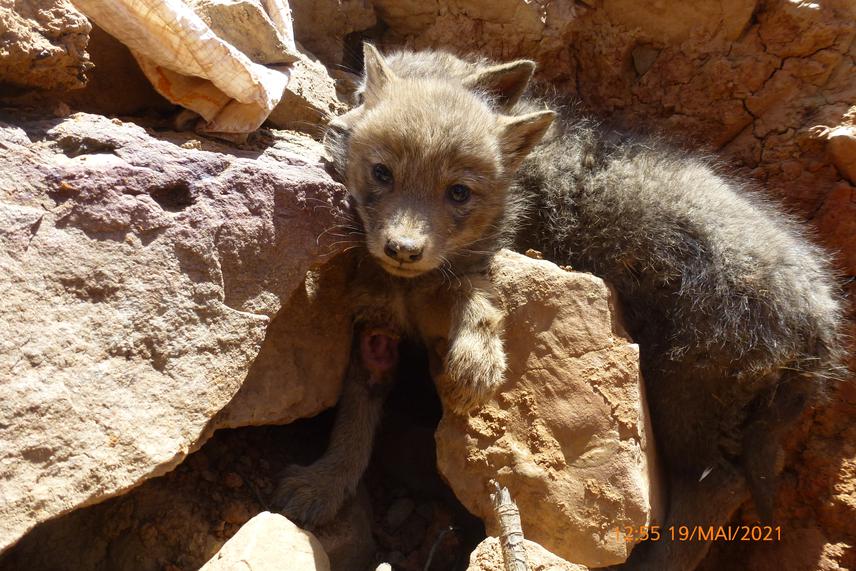Abderrazak El Alami
The project aims to study the carnivore ecology and distribution, to assess the interactions between carnivores and local communities, to find the possible solutions and to develop a plan for the conservation of threatened species in the central High Atlas Mountains of Morocco. These mountains encompass an area of 10 502 km² and have a great diversity of habitats and of plant and animal species. We will conduct interviews with inhabitants, and we will carry out field surveys in the study area. Data will collect on carnivore species: distribution, status, quality of habitats, identification of the extinct and threatened species in the study area, examination of carnivore extinctions, human-carnivore conflict and information about the capture, killing, trade or poaching of carnivores. The scientific results of this project will be share with the Moroccan forestry department and with local authorities, associations and people.

A young individual of the African wolf with visible injuries captured by an inhabitant in the central High Atlas of Morocco.
In Morocco, the forest ecosystems of the High Atlas are strategic because of their various socioeconomic and ecological roles. Mammals play important ecological roles in ecosystems. Conflict between local people and wild mammals is one of the greatest challenges to conservation of the species in Morocco. This project aims to determine the status of the current carnivore species in the Central High Atlas Mountains of Morocco, to assess the human-carnivore interactions, to identify the current threats and to develop possible solutions. The results will give important information for the conservation and management of the carnivore species. These mountains encompass an area of 10 502 km² and have a great diversity of habitats and species. This area is home to a variety of animal species especially mammals with more than 24 mammal species. In this area, there were last observations of several mammal species in Morocco as the case of the serval (1966), the panther (1983) and the Barbary lion (1942). For this, these mountains play an important role in the history of the Moroccan carnivores.
We will examine the extinction of five carnivores: Panthera pardus, Panthera leo leo, Leptailurus serval, Herpestes ichneumon and Hyaena hyaena in the study area and We will collect Data about the current species in the study area: Canis aureus, Vulpes vulpes, Genetta genetta, Felis silvestris, Mustela nivalis and Lutra lutra. We will use a combination of standardized interviews combined with a direct count survey to gather information about carnivores. Interviews will carry out with all people with a direct link to wildlife and with the local officials of the Moroccan Forestry Department. Based on interview data, we will conduct field surveys. We will survey 400 km during 56 days with 2-5 assistants. In this study, the use of camera traps will complement the data obtained from ecological surveys.
Based on results of this project, we will elaborate a conservation plan for carnivore species in the Moroccan High Atlas Mountains. This plan will be for the Moroccan forestry department, local authorities, associations and local people. Data from this project will be useful for conserving carnivores in the study area and in the countries where these species survive today (many counties of Africa, Asia, and/or Europe). Solutions will help to conserve habitats, species and improve local public opinion regarding the conflict between inhabitants and carnivores.